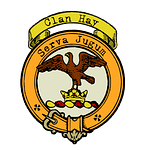Welcome back to "A Clan A Day Podcast," brought to you by BagTownClans.com. I’m your host, Colin MacDonald, and today we explore the fascinating history of Clan MacTavish. This Highland clan is steeped in both Gaelic and Norse traditions, tracing its roots to the rugged landscapes of Knapdale and carrying a legacy of resilience that spans centuries. From the Dalriadic kingdom to the New World, the MacTavishes have proven themselves a distinct and proud Scottish clan.
The story of Clan MacTavish begins with Taus Coir, also known as Thomas the Just, a son of Gillespic and a daughter of Sween the Red, Lord of Castle Sween in the 11th century. Taus Coir is considered the progenitor of the clan, which became known in Gaelic as MacTamhais. Over time, the name evolved with the adoption of English spelling, appearing in historical records as MacAvis, MacCamis, and MacTavish. The clan’s ancestral lands were located in North and South Knapdale, where they lived as part of the ancient Dalriadic kingdom centered around Dunadd.
Clan MacTavish has long been recognized as one of Scotland’s original clans, distinct from the Campbells, despite claims that the two are connected. Historical records and genealogies have often tried to align the MacTavishes as a Campbell sept, but evidence such as their settlement at Dunardry before the Campbells’ arrival in Argyll supports their independent origins. The MacTavishes have always maintained their own identity, with their crest—a boar’s head—symbolizing strength and defiance.
The Jacobite risings of the 18th century brought both opportunity and hardship for the MacTavishes. Dugald MacTavish of Dunardry supported the cause of Bonnie Prince Charlie, corresponding with Sir James Campbell of Auchnabreck to organize their forces. Unfortunately, their plans were intercepted by the Duke of Argyll, leading to Dugald’s arrest in 1745 and imprisonment in Dunbarton. While this prevented the clan from rallying at Culloden, it spared them from the devastating reprisals that followed the Jacobite defeat.
In the aftermath of Culloden, many Highlanders faced displacement and persecution. The MacTavishes avoided such a fate, in part because their chief was imprisoned during the battle. However, like many clans, they adapted to survive. Some members adopted anglicized surnames like Thompson and emigrated to Ireland, the Lowlands, and the New World. Despite these challenges, the Chiefly line of MacTavish remained intact, ensuring the clan’s continuity.
The late 18th century saw further upheaval for the MacTavishes. The construction of the Crinan Canal, which bisected their lands, imposed significant financial strain. Lachlan MacTavish, then the chief, was forced to sell Dunardry in 1785. Lachlan’s son, Dugald, later built Kilchrist Castle and served as Sheriff-Substitute of Kintyre, continuing the family’s leadership during a challenging period.
The MacTavishes’ legacy extended far beyond Scotland. Dugald’s son, William, emigrated to Canada with the Hudson Bay Company, eventually rising to become Governor of Assiniboia and Rupert’s Land. William played a key role in events leading to the confederation of Canada in 1867, demonstrating the clan’s influence on a global stage. This remarkable chapter in MacTavish history underscores their resilience and ability to thrive in new environments.
For nearly two centuries, the Chiefship of Clan MacTavish lay dormant. This changed in 1949, when the Lord Lyon King of Arms identified the Canadian branch of the family as the rightful heirs to the Chiefship. In 1997, Edward Stewart Dugald MacTavish was officially recognized as the 26th Chief of the Clan MacTavish, restoring a vital link to their storied past.
Throughout their history, the MacTavishes have stood as a testament to the enduring spirit of the Highland clans. Their loyalty to the Stuart cause, their determination to preserve their lands and traditions, and their contributions to Scotland and beyond speak to the strength of their heritage. The clan’s modern revival, with gatherings and celebrations, ensures that their unique identity continues to thrive.
Thank you for joining us as we explored the remarkable history of Clan MacTavish. Be sure to tune in tomorrow for another episode of "A Clan A Day Podcast." I’m Colin MacDonald, and as always, Go n-éirí an bóthar leat!











